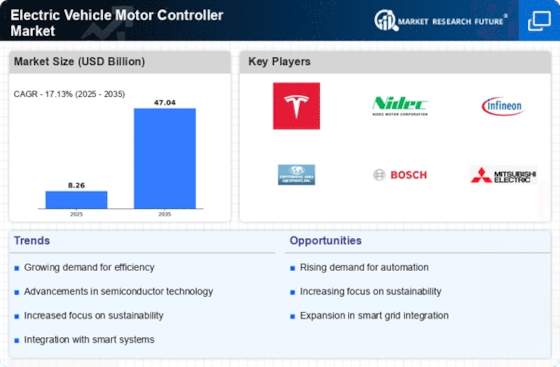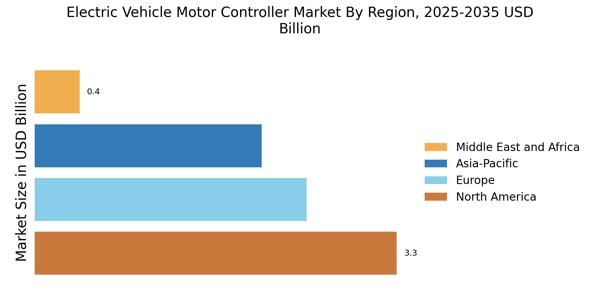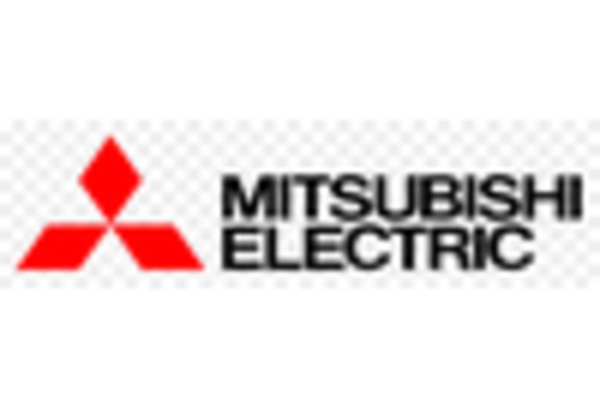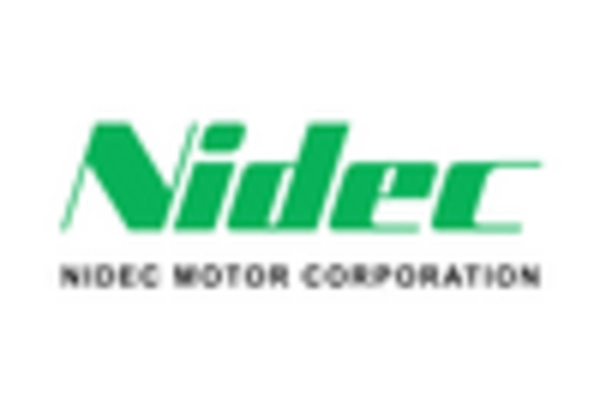Government Incentives and Support
Government policies and incentives aimed at promoting electric vehicle adoption are playing a crucial role in shaping the Electric Vehicle Motor Controller Market. Many countries have implemented tax rebates, subsidies, and grants to encourage consumers to purchase electric vehicles. These initiatives not only stimulate demand for EVs but also create a favorable environment for the development of supporting technologies, including motor controllers. As governments continue to prioritize sustainability and emissions reduction, the Electric Vehicle Motor Controller Market is likely to experience accelerated growth, driven by increased investments in research and development of advanced motor control technologies.
Rising Demand for Electric Vehicles
The increasing consumer preference for electric vehicles (EVs) is a primary driver for the Electric Vehicle Motor Controller Market. As more individuals and businesses seek to reduce their carbon footprint, the demand for EVs has surged. According to recent data, the sales of electric vehicles have seen a compound annual growth rate of over 20% in recent years. This trend is expected to continue, leading to a corresponding rise in the need for efficient motor controllers that can enhance vehicle performance and energy efficiency. The Electric Vehicle Motor Controller Market is thus positioned to benefit from this growing demand, as manufacturers strive to develop advanced motor control technologies that meet the evolving needs of the automotive sector.
Focus on Energy Efficiency and Performance
The emphasis on energy efficiency and performance in electric vehicles is a key driver for the Electric Vehicle Motor Controller Market. Consumers are increasingly seeking vehicles that not only reduce emissions but also offer superior performance. Motor controllers play a pivotal role in achieving these objectives by optimizing the power delivery to the electric motor. As manufacturers strive to enhance the driving experience while maintaining energy efficiency, the demand for advanced motor control solutions is likely to rise. This focus on performance and efficiency is expected to propel the Electric Vehicle Motor Controller Market forward, as companies innovate to meet consumer expectations.
Technological Innovations in Motor Control
Technological advancements in motor control systems are significantly influencing the Electric Vehicle Motor Controller Market. Innovations such as the integration of artificial intelligence and machine learning into motor controllers are enhancing their efficiency and performance. These technologies allow for real-time adjustments to optimize energy consumption and improve vehicle dynamics. Furthermore, the development of more compact and lightweight motor controllers is enabling manufacturers to design more efficient electric drivetrains. As a result, the Electric Vehicle Motor Controller Market is witnessing a shift towards more sophisticated and capable motor control solutions, which are essential for the next generation of electric vehicles.
Growing Infrastructure for Electric Vehicles
The expansion of charging infrastructure is a vital driver for the Electric Vehicle Motor Controller Market. As more charging stations are established, consumer confidence in electric vehicles is bolstered, leading to increased adoption. This infrastructure development is essential for addressing range anxiety, a significant barrier to EV adoption. The presence of a robust charging network encourages manufacturers to invest in electric vehicle technologies, including advanced motor controllers. Consequently, the Electric Vehicle Motor Controller Market is expected to thrive as the infrastructure continues to grow, facilitating a smoother transition to electric mobility.

















